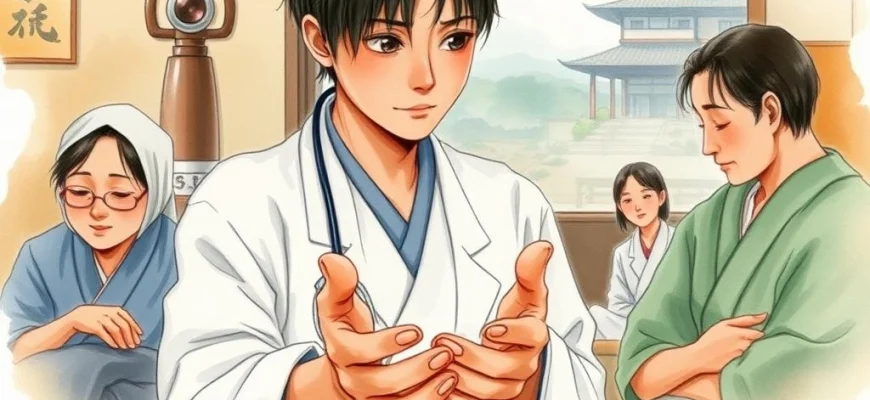If you were moved by the profound humanity and emotional depth of Akira Kurosawa's 'Red Beard' (1965), this article is for you. We’ve curated a list of 10 films and shows that share its themes of compassion, mentorship, and the struggles of the human condition. Whether you're a fan of classic cinema or seeking stories with similar emotional weight, these recommendations will resonate with you.

Late Spring (1949)
Description: A tender story of a father and daughter navigating societal expectations and personal sacrifice. The film's subtle emotional power and meticulous attention to detail reflect the reference's nuanced storytelling and humanistic focus.
Fact: Late Spring is considered a masterpiece of Japanese cinema. It was the first collaboration between its director and lead actress, who would work together on many more films.
 Watch Now
Watch Now 
Early Summer (1951)
Description: A gentle yet profound exploration of family dynamics and the passage of time, centered around a woman's decision to marry. The film's quiet realism and deep emotional resonance mirror the reference's emphasis on everyday life and human connections.
Fact: Early Summer is part of a thematic trilogy, though each film stands alone. It features a mix of professional and non-professional actors to enhance its naturalistic feel.
 Watch Now
Watch Now 
Ikiru (1952)
Description: A profound exploration of human existence and the search for meaning, focusing on a terminally ill bureaucrat who seeks to make a difference in his final days. The film's deep emotional resonance and philosophical undertones mirror the introspective and humanistic qualities of the reference.
Fact: The film's title translates to 'To Live' in English, reflecting its central theme. It was voted the 5th greatest film of all time in the 2012 Sight & Sound directors' poll.
 Watch Now
Watch Now 
Tokyo Story (1953)
Description: A poignant family drama that examines generational gaps and the quiet sorrow of aging. The film's understated yet deeply moving narrative and its focus on everyday human struggles align with the reference's empathetic and contemplative approach.
Fact: Tokyo Story is often ranked as one of the greatest films in cinema history. It was voted the greatest film of all time in the 2012 Sight & Sound directors' poll.
 Watch Now
Watch Now 
Ugetsu (1953)
Description: A hauntingly beautiful tale set during wartime, blending reality and the supernatural to explore themes of ambition, love, and loss. The film's poetic storytelling and deep emotional impact resonate with the reference's lyrical and introspective style.
Fact: Ugetsu won the Silver Lion at the Venice Film Festival. It is often cited as one of the greatest films ever made, praised for its atmospheric cinematography.
 Watch Now
Watch Now 
Sansho the Bailiff (1954)
Description: A tragic and visually stunning story of family separation and resilience under oppression. The film's exploration of human suffering and redemption, along with its masterful visual composition, echoes the reference's emotional depth and aesthetic precision.
Fact: The film is based on a medieval Japanese folk tale. It was restored and re-released in 2006, introducing it to a new generation of audiences.
 Watch Now
Watch Now 
Harakiri (1962)
Description: A powerful samurai drama that critiques feudal hypocrisy and honor through a series of flashbacks. The film's meticulous pacing, moral complexity, and devastating emotional impact align with the reference's themes of justice and human dignity.
Fact: Harakiri was the first Japanese film to win the Jury Prize at the Cannes Film Festival. It was remade in 2011, but the original remains highly acclaimed.
 Watch Now
Watch Now 
High and Low (1963)
Description: A gripping crime drama that delves into moral dilemmas and social inequality, showcasing a wealthy businessman's struggle when his chauffeur's son is kidnapped. The film's intense character studies and ethical conflicts align with the reference's focus on human nature and societal issues.
Fact: The film is based on the novel 'King's Ransom' by Ed McBain. It is notable for its meticulous use of widescreen composition to heighten tension.
 Watch Now
Watch Now 
Onibaba (1964)
Description: A chilling folk horror film set in a war-torn landscape, exploring primal human instincts and survival. The film's stark black-and-white cinematography and psychological intensity mirror the reference's atmospheric and thematic depth.
Fact: Onibaba is known for its use of tall grass fields as a central visual motif. The film's title translates to 'Demon Woman' in English.
 Watch Now
Watch Now 
Woman in the Dunes (1964)
Description: A surreal and existential drama about a man trapped in a sand pit with a mysterious woman. The film's allegorical storytelling and exploration of human confinement and desire resonate with the reference's philosophical and psychological themes.
Fact: The film won the Special Jury Prize at the Cannes Film Festival. It is based on the novel by Kobo Abe, who also wrote the screenplay.
 Watch Now
Watch Now 








